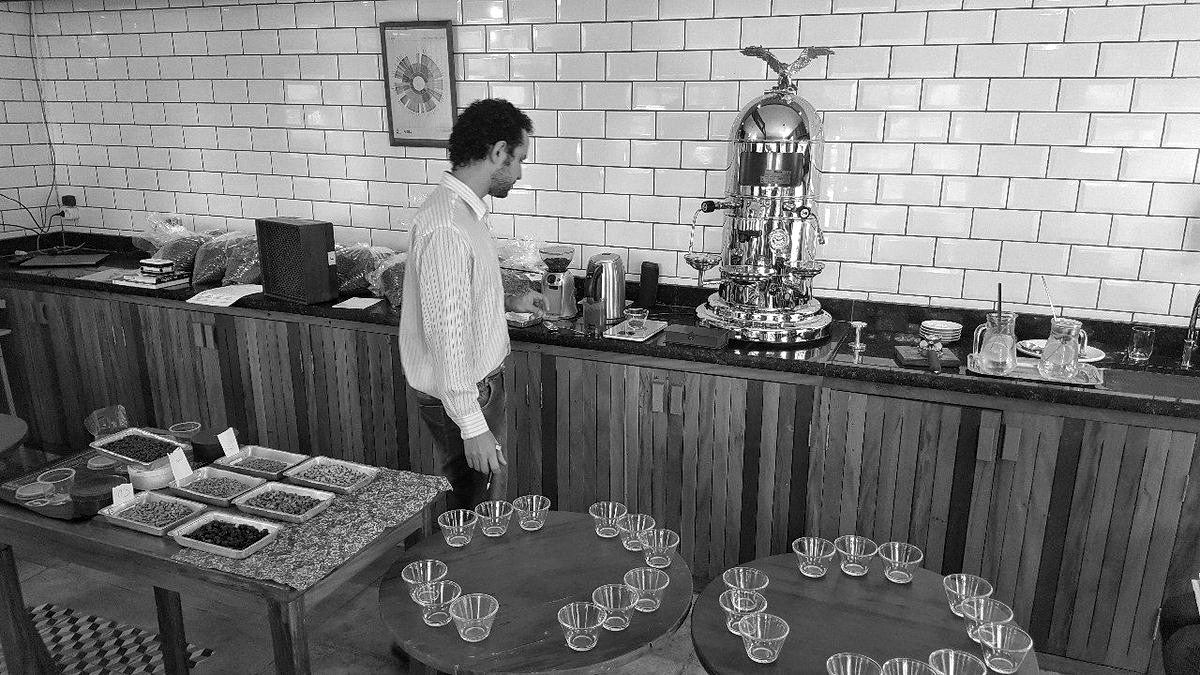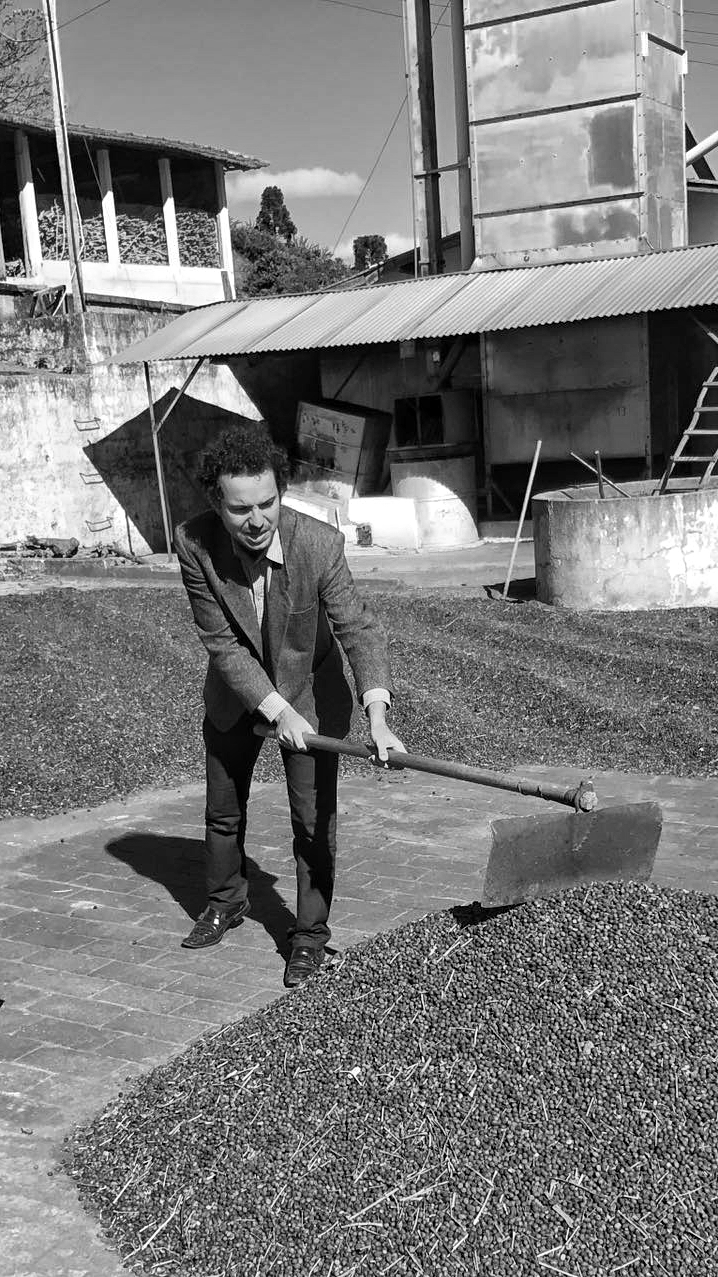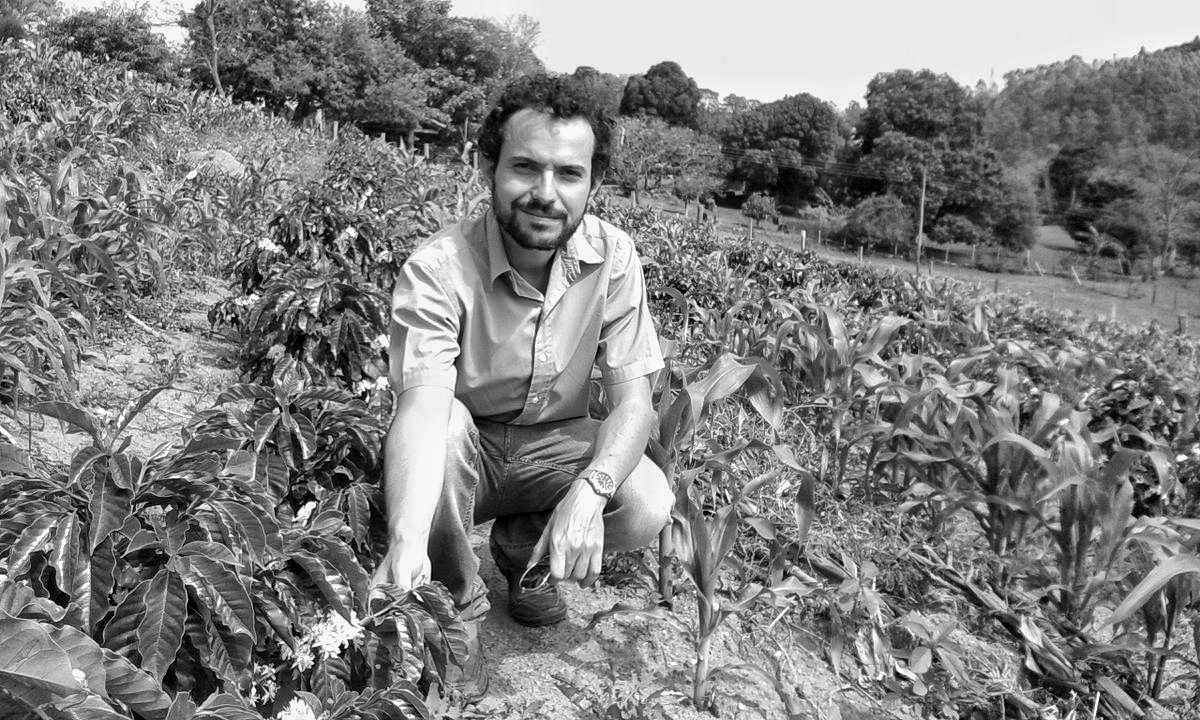Interview: Jonas Leme Ferraresso, Coffee Agronomist
The Brazilian agronomist talks about his background in coffee and how the coffee price crisis has affected farmers in Brazil.

Born and raised in the city of Serra Negra, in Southeast Brazil’s São Paulo state, Jonas Leme Ferraresso is an agronomist and coffee jack-of-all-trades who has held many jobs within the coffee supply chain: he has dabbled in roasting, farming, consultancy, and exporting just to name a few.
Jonas generously took the time to answer some questions over email about his background in coffee, how the coffee price crisis has affected farmers in Brazil, and much more.
This interview has been edited for clarity and length.
What is your first coffee memory?
I was practically born in the coffee plantations. I’m the fourth generation that is linked with the crop.
In the middle of the 19th century my great-grandfather came from Italy to Brazil and worked in coffee fields, my grandfather and grandmother were coffee pickers, and my father owns a little coffee farm.
My first memory, as far as I can remember, was running between the coffee trees.
How did you get involved in the industry?
Since I got into university I have wanted to be a coffee professional. When I got my degree in agronomy, and started working with coffee farmers, I saw their need to sell their beans for better value.
Over the years, I have gained new skills like cupping, roasting, packaging, trade, production of specialty coffees, certification, exporting, barista skills etc, to help them to keep their businesses running.
What is your current role within coffee?
Today I do a lot of stuff in the coffee chain as a coffee consultant for farmers, assisting them in nutrition, harvest, storage, certification, specialty batch, etc.

I’m responsible for the specialty coffee competition in the São Paulo water region, and work as an engineer and designer for a new coffee roaster manufacture company. I’m the field supervisor for a research experiment led by Agronomic Institute of Campinas—we are studying about 30 varieties of coffee, and checking their results to find the best options for farmers.
I also do trainings and lectures for farmers, students, roasters, coffee shop owners and enthusiasts about many coffee subjects. I have a small coffee farm too in a mountainous region of Brazil, and finally write articles and stories about coffee for national magazines and some specialized coffee websites.
OK, getting into the serious stuff. What effect is the global coffee price crisis having in Brazil? Have you spoken to producers about it?
The global coffee price crises over the last few months were the last straw that broke the camel’s back. Since 2002 the farmers saw their profits getting lower every year, while the expenses in fertilizers, human resources and tax increase.

Since then many producers are moving to flat areas like Cerrado to produce mechanized coffee and reduce costs, but now even there the profits are close to minimum.
In mountainous areas like the ones where I work, we lost money in coffee fields before that crisis, but coffee crop is not an easy thing to replace, and in hilly areas there is not too much option for cultivation. I’m very worried if these farmers will afford to manage their coffee plants well for the next season.
This year almost all coffee farms will harvest less coffee—the quality is not as good as last season, and with these price levels, there is not enough money even for fertilization.
As a coffee agronomist I know a lot of technologies and techniques that can improve coffee quality and revenue, but due to the coffee crisis the farmers cannot afford new expenses in their lands.
Today the machinery is old, the fields need to be replanted and renovated, but there is no money to do such things. It is probably one of the worst bankruptcy spirals that I have ever seen.
How can those on the consuming end of the coffee chain help to address the coffee price crisis?
Direct trade, traceability, and some certification models are very good mechanisms to improve the amount of money which reach coffee farmers—it is not a solution, but it is a good first step.
The customer should pressure cafes, groceries, supermarkets or wherever to be aware of this idea, and sell only fair and sustainable coffee beans and grounds.
The best way would be to follow the wine model, and in the future coffee farmers start to sell packed coffee with their own brand. In Brazil some farmers that I work with already do that, so in that way almost all the profit are transferred direct to farmer, not to intermediaries.
Are there any positive stories you have witnessed recently, despite everything?
In the fields I can talk about three farms. First is the Boa Esperança Coffee Farm, a very traditional place founded as a coffee farm in 1896. They did their first direct trade business with South Korea in 2014 and get a 750% profit compared to a regular sale.

The San Roque Organic Coffee Farm: the farm used to be a conventional farm, their Arabica fields are located at 680 meters above sea level, and many coffee professionals said it’s impossible to grow good Arabica at this level.
After a few years the owner changed to organics, and harvested specialty coffee every year.
The last is the San Gerald Coffee Farm, a traditional family land which used to sell their beans at international prices. Now they harvest very specialty coffee, and sell their coffee roasted and packed, with their farm name, like fine wine.
How are coffee producers in Brazil adapting to the realities of climate change?
It’s been a big challenge since the 2014 drought, we have had heat waves and uneven rains since then. For 6 years we haven’t had normal climate conditions for the plant—the coffee physiology and biochemistry is upside down, the flowerings are uneven, the branch, root, leaf and berry developments are below expected, and disease and plagues are striking the coffee trees more intensely every year both in low and high lands.
This year in Brazil, we have a very strong coffee leaf rust strike due to a high volume of rain over the last few months, and good temperature conditions for the disease.
Many producers are unprepared, and with low resources to buy products to heal their fields, next year’s harvest is already damaged in many places.
What does the future of coffee look like for producers in Brazil?
The specialty coffee and the direct trade segment are giving a little hope for farmers—the world now sees Brazil as a specialty coffee producer, not just low quality and volume coffee exporter.
It is still a long path to reach those specialty markets outside of Brazil, as many traders think Brazilian coffee is just harvest by machines in huge lands, but they don’t know that 66% of farmers in Brazil have less than 20 hectares (49 acres) of coffee—I work for a client with 2 hectares of coffee, for example.
The price crisis is affecting these small farmers directly, which could impact the world coffee supply for 2019/2020.
What are your personal ambitions for the future?
I hope someday coffee could be profitable for farmers. Almost all the farmers that I work with have a huge love for their fields and their job, but over the last 20 years the poverty shadow is reaching many of them. They have no option but to sell their beloved land and find another way to support their families.
I hope someday to work for an international coffee foundation or company to help coffee farmers around the world, and carry all my knowledge and know-how to them.
Finally, what is your favorite brew method?
I like the Aeropress method: it is very simple, easy to use and delivers excellent and balanced coffee cups almost every time even for less skilled operators.
Jonas Leme Ferraresso is a coffee agronomist, farmer, roaster, cupper, barista, independent writer, lecturer and coffee consultant. His website is serranegracafe.wixsite.com/jonaslemeferraresso and he is on Twitter @Jonasandsax






